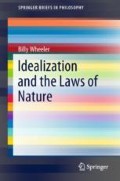Abstract
Chapter 2 investigates the potential for a theory of the metaphysics of ideal laws based around governing conceptions of lawhood. Three existing approaches are discussed: Armstrong’ theory of nomic necessitation, Cartwright’s capacity conception of laws, and Ellis’ theory of laws as essences of natural kinds. It is argued that none of these conceptions can provide a suitable explanation of the existence of ideal laws.
Access this chapter
Tax calculation will be finalised at checkout
Purchases are for personal use only
References
Armstrong, D. 1983. What is a law of nature? Cambridge: Cambridge University Press.
Beebee, H. 2000. The non-governing conception of laws of nature. Philosophy and Phenomenological Research LXI (3): 571–594.
Bigelow, J. 1999. Scientific essentialism. In Causation and the laws of nature, ed. H. Sankey, 45–59. Dodrecht: Kluwer.
Bird, A. 1998. Dispositions and antidotes. The Philosophical Quarterly 48: 227–234.
Bird, A. 2005a. The dispositionalist conception of laws. Foundations of Science 10: 353–370.
Bird, A. 2005b. Laws and essences. Ratio 18: 437–461.
Cartwright. 1999. The dappled world. Cambridge: Cambridge University Press.
Cartwright, N. 1983. How the laws of physics lie. Oxford: Oxford University Press.
Cartwright, N. 2002. In favour of laws that are not Ceteris Paribus after all. Erkenntnis 57: 425–439.
Cartwright, N. 1989. Nature’s capacities and their measurement. Oxford: Oxford University Press.
Dretske, F. 1977. Laws of nature. Philosophy of Science 44: 248–268.
Drewery, A. 2001. Dispositions and Ceteris Paribus laws. British Journal for the Philosophy 52: 723–733.
Ellis, B. 2001. Scientific essentialism. Cambridge: Cambridge University Press.
Ellis, B. 2002. The philosophy of nature: A guide to the new essentialism. Montreal: McGill-Queen’s University Press.
Ellis, B., and C. Lierse. 1994. Dispositional essentialism. Australasian Journal of Philosophy 72 (1): 27–45.
Forge, J. 1986. David Armstrong on functional laws. Philosophy of Science (53) 4: 584–587.
Gnassounou, B, and M Kistler. 2007. Dispositions and causal powers. Aldershot: Ashgate.
Goodman, N. 1954. Fact, fiction and forecast. Cambridge: Harvard University Press.
Handfield, T. 2001. Dispositional essentialism and the possibility of a law-abiding miracle. The Philosophical Quarterly 51 (205): 484–494.
Harre, R., and E.H. Madden. 1975. Causal powers: A theory of natural necessity. Oxford: Blackwell.
Hüttemann, A. 2007. Causation, laws and dispositions. In Dispositions and causal powers, ed. B. Gnassounou, and M. Kistler, 207–219. Aldershot: Ashgate.
Hüttemann, A. 2014. Ceteris Paribus laws in physics. Erkenntnis 79: 1715–1728.
Hüttemann, A. 1998. Laws and dispositions. Philosophy of Science 65 (1): 121–135.
Kripke, S. 1980. Naming and necessity. Cambridge: Harvard University Press.
Lipton, P. 1999. All else being equal. Philosophy 74 (2): 155–168.
Martin, C.B. 1994. Dispositions and conditionals. The Philosophical Quarterly 44: 1–8.
Psillos, S. 2008. Cartwright’s realist toil: From entities to capacities. In Nancy Cartwright’s philosophy of science, ed. S. Hartmann, and C. Hoefer, 167–194. London: Routledge.
Quine, W.V.O. 1960. Word and object. Cambridge: MIT Press.
Rosen, G. 2017. Abstract Objects. Stanford Encyclopedia of philosophy. Spring. https://plato.stanford.edu/archives/spr2017/entries/abstract-objects.
Ryle, G. 1949. The concept of mind. London: Hutchinsons Universal Library.
Schrenk, M. 2007. The metaphysics of Ceteris Paribus laws. Lancaster: Ontos-Verlag.
Schurz, G. 2002. Ceteris Paribus laws: Classification and deconstruction. Erkenntnis 57 (3): 351–372.
Smith, A. 1977. Dispositional properties. Mind 86: 439–445.
Tooley, M. 1977. The nature of laws. Canadian Journal of Philosophy 77 (4): 667–698.
Vallentyne, P. 1988. Explicating lawhood. Philosophy of Science 55 (4): 598–613.
Author information
Authors and Affiliations
Corresponding author
Rights and permissions
Copyright information
© 2018 The Author(s), under exclusive license to Springer Nature Switzerland AG, part of Springer Nature
About this chapter
Cite this chapter
Wheeler, B. (2018). Governing Law Solutions to Ideal Laws. In: Idealization and the Laws of Nature. SpringerBriefs in Philosophy. Springer, Cham. https://doi.org/10.1007/978-3-319-99564-9_2
Download citation
DOI: https://doi.org/10.1007/978-3-319-99564-9_2
Published:
Publisher Name: Springer, Cham
Print ISBN: 978-3-319-99563-2
Online ISBN: 978-3-319-99564-9
eBook Packages: Religion and PhilosophyPhilosophy and Religion (R0)

